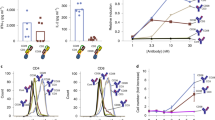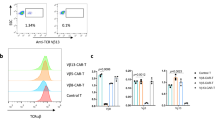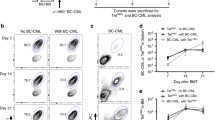Abstract
T-cell co-stimulation delivered by the molecules B7-1 or B7-2 through CD28 has a positive effect on T-cell activation1, whereas engagement of cytotoxic T-lymphocyte antigen 4 (CTLA-4) by these molecules inhibits activation2. In vivo administration to mice of blocking monoclonal antibodies or Fab fragments against CTLA-4 can augment antigen-specific T-cell responses3,4 and, thus, therapy with monoclonal antibody against CTLA-4 has potential applications for tumor therapy and enhancement of vaccine immunization5,6,7. The effects of B7-1 and B7-2 co-stimulation through CD28 depend on the strength of the signal delivered through the T-cell receptor (TCR)8,9 and the activation state of T cells during activation10,11. Thus, we sought to determine whether these factors similarly influence the effect of B7-mediated signals delivered through CTLA-4 during T-cell activation. Using freshly isolated human T cells and Fab fragments of a monoclonal antibody against CTLA-4, we demonstrate here that CTLA-4 blockade can enhance or inhibit the clonal expansion of different T cells that respond to the same antigen, depending on both the T-cell activation state and the strength of the T-cell receptor signal delivered during T-cell stimulation. Thus, for whole T-cell populations, blocking a negative signal may paradoxically inhibit immune responses. These results provide a theoretical framework for clinical trials in which co-stimulatory signals are manipulated in an attempt to modulate the immune response in human disease.
This is a preview of subscription content, access via your institution
Access options
Subscribe to this journal
Receive 12 print issues and online access
$209.00 per year
only $17.42 per issue
Buy this article
- Purchase on Springer Link
- Instant access to full article PDF
Prices may be subject to local taxes which are calculated during checkout



Similar content being viewed by others
References
Lenschow, D.J., Walunas, T.L. & Bluestone, J.A. CD28/B7 system of T cell costimulation. Annu. Rev. Immunol. 14, 233–258 (1996).
Thompson, C.B. & Allison, J.P. The emerging role of CTLA-4 as an immune attenuator. Immunity 7, 445–450 (1997).
Morton, P.A., Loh, D.Y., Bluestone, J.A. & Jenkins, M.K. Antigen-dependent clonal expansion of a trace population of antigen-specific CD4+ T cells in vivo is dependent on CD28 costimulation and inhibited by CTLA-4. J. Immunol. 155, 1032–1036 (1995).
Walunas, T.L. & Bluestone, J.A. CTLA-4 regulates tolerance induction and T cell differentiation in vivo. J. Immunol. 160, 3855–3860 (1998).
Kwon, E.D. et al. Manipulation of T cell costimulatory and inhibitory signals for immunotherapy of prostate cancer. Proc. Natl. Acad. Sci. USA 94, 8099–8103 (1997).
McCoy, K., Camberis, M. & Le Gros, G. Protective immunity to nematode infection is induced by CTLA-4 blockade. J. Exp. Med. 186, 183–187 (1997).
Murphy, M.L., Cotterell, S.E.J., Gorak, P.M.A., Engwerda, C.R. & Kaye, P.M. Blockade of CTLA-4 enhances host resistance to the intracellular pathogen, Leishmania donovani. J. Immunol. 161, 4153–4160 (1998).
Anderson, D.E. et al. Weak peptide agonists reveal functional differences in B7-1 and B7-2 costimulation of human T cell clones. J. Immunol. 159, 1669–1675 (1997).
Fields, P.E. et al. B7.1 is a quantitatively stronger costimulus than B7.2 in the activation of naïve CD8+ TCR-transgenic T cells. J. Immunol. 161, 5268–5275 (1998).
Scholz, C., Patton, K.T., Anderson, D.E., Freeman, G.J. & Hafler, D.A. Expansion of autoreactive T cells in multiple sclerosis is independent of exogenous B7 costimulation. J. Immunol. 160, 1532–1538 (1998).
Lovett- Racke, A.E. et al. Decreased dependence of myelin basic protein-reactive T cells on CD28-mediated costimulation in multiple sclerosis patients. A marker of activated/memory T cells. J. Clin. Invest. 101, 725–730 (1998).
Azuma, M. et al. B70 antigen is a second ligand for CTLA-4 and CD28. Nature 366, 76–79 (1993).
Hathcock, K.S., Laszlo, G., Pucillo, C., Linsley, P., and Hodes, R.J. Comparative analysis of B7-1 and B7-2 costimulatory ligands: expression and function. J. Immunol. 180, 631–640 (1994).
Jeannin, P. et al. Human effector memory T cells express CD86: a functional role in naïve T cell priming. J. Immunol. 162, 2044–2048 (1999).
Saha, B., Chattopadhyay, S., Germond, R., Harlan, D.M. & Perrin, P.J. CTLA4 (CD152) modulates the Th subset response and alters the course of experimental Leishmania major infection. Eur. J. Immunol. 28, 4213–4220 (1998).
Rissoan, M.C. et al. Reciprocal control of T helper cell and dendritic cell differentiation. Science 283, 1183–1186 (1999).
Bieganowska, K.D. et al. Direct ex vivo analysis of activated, fas-sensitive autoreactive T cells in human autoimmune disease. J. Exp. Med. 185, 1585–1594 (1997).
Wucherpfennig K.W. et al. Structural requirements for binding of an immunodominant myelin basic protein peptide to DR2 isotypes and for its recognition by human T cell clones. J. Exp. Med. 179, 279–290 (1994).
Linsley, P.S. et al. Coexpression and functional cooperation of CTLA-4 and CD28 on activated T lymphocytes. J. Exp. Med. 176, 1595–1604 (1992).
Metz, D.P., Farber, D.L., Taylor, T. & Bottomly, K. Differential role of CTLA-4 in regulation of resting memory versus naïve CD4 T cell activation. J. Immunol. 161, 5855–5861 (1998).
LaSalle, J.M. and Hafler, D.A. The coexpression of CD45RA and CD45RO isoforms on T cells during the S/G2/M stages of cells cycle. Cell Immunol. 138, 197–206 (1991).
Acknowledgements
We thank V. Kuchroo and members of his laboratory for discussions. This work was supported by National Institutes of Health/National Institute of Allergy and Infectious Diseases grants 1PO1A139671-03, RO1DK52127, RO1NS2424710A2 (D.A.H.), and a grant from Genetics Institute (D.A.H.). A.B. was supported by a Multiple Sclerosis Society of Canada Research Fellowship and by the Clinical Investigator Training Program: Harvard/Massachusetts Institute of Technology Health Sciences and Technology–Beth Israel Deaconess Medical Center, in collaboration with Pfizer.
Author information
Authors and Affiliations
Rights and permissions
About this article
Cite this article
Anderson, D., Bieganowska, K., Bar-Or, A. et al. Paradoxical inhibition of T-cell function in response to CTLA-4 blockade; heterogeneity within the human T-cell population. Nat Med 6, 211–214 (2000). https://doi.org/10.1038/72323
Received:
Accepted:
Issue Date:
DOI: https://doi.org/10.1038/72323
This article is cited by
-
Structure Based Screening for Inhibitory Therapeutics of CTLA-4 Unveiled New Insights About Biology of ACTH
International Journal of Peptide Research and Therapeutics (2020)
-
T cell costimulation, checkpoint inhibitors and anti-tumor therapy
Journal of Biosciences (2020)
-
Inflammatory Joint Disorders and Neutrophilic Dermatoses: a Comprehensive Review
Clinical Reviews in Allergy & Immunology (2018)



